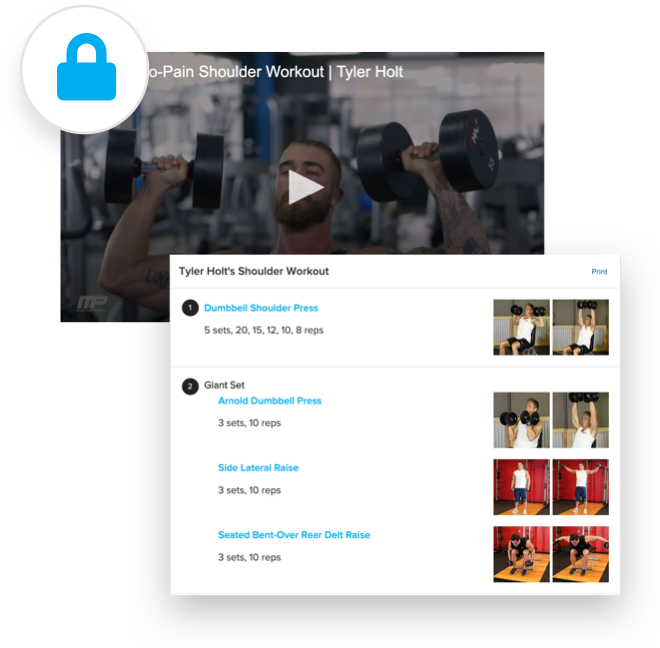What is strength? Ask 10 different people what strength means to them, and you'll get 10 different answers. For some, it's the physical grind that makes heavy things eventually feel light. For others, it's being able to make a difficult decision and stick with it or face down a pervasive negative thought or emotional challenge.
Ask Elliot Hulse, the founder of the YouTube fitness sensation Strength Camp, and he'll unload an answer that makes you realize just how big, important, and multifaceted strength is. He's helped millions of loyal viewers become the strongest version of themselves since all the way back in 2007.
In that time, countless YouTube fitness personalities have come and gone, but for many, Strength Camp is the standard against which they're all measured.
He practices what he preaches, too. When it comes time to train, Elliot beats the shit out of weights—and Atlas stones and tires and prowlers.
I reached out to Elliot between the launch of the new book he wrote with Chris Barnard, "King: The IV-Layer Approach to Becoming the Strongest Version of Yourself." (Full disclosure: I helped edit the book), production of his numerous videos, and domination in the weight room to talk about Strength Camp and what it means to live a stronger life.
Q. Bodybuilding.com's motto is "Become Your Best Self." For Strength Camp, what does it mean to "Become the Strongest Version of Yourself?"
When I say "grow stronger," it doesn't mean you're going to deadlift more weight necessarily. It means your character is expanding; your health, your mental health, your relationships, your career—all these things add to the development of your strength. When I work with clients, customers, and YouTube viewers, the message is that strength is holistic.
How Strength Saved My Life
Watch the video - 5:28
What do you mean by "holistic" health?
I like to say, "Your body is your mind." It means that we must care for our bodies with the understanding that doing so affects our characters, our psychology, and our physiology. Our muscles and organs stem from our root system, which is made up of our brain and central nervous system.
We all do a good job separating mind and body. But I think we need to get in touch with the intelligence of our bodies and understand how our activities, our exercises, our food, and our lifestyles affect our mind-body connection.
When I first took a holistic approach to fitness, I had to get in touch with aspects of my own fitness that were lacking. In my case, I took a year-long hiatus from strength training and went into yoga and meditation. I am now attempting to balance the development of my physical strength in the gym with what I would call "working in." As opposed to working out, working in is "the inside of the exercise program," like foam rolling, corrective stretching, meditation, and yoga.
In action, this means that if I spend three hours a week strength training, I'll balance that with 3-4 hours of corrective work, mobilization, and meditation. In my videos, I often talk about this "working in" as being "tender aggressive." Essentially, it means balancing aggressive training with treating your body tenderly by getting to bed on time, getting massaged, foam rolling, stretching, deep breathing, and meditating.
These are interesting ideas. Who influenced you in this way of thinking?
It's a very eastern idea. I first heard about it from Alan Watts, an Eastern philosophy scholar who spent decades living in parts of China, India, and Japan. I must've been about 18 years old when I first listened to his talks on Napster, and he often talked about this connection between what we believe to be our physical body and its affect on our mind.
For instance, if I need to think better, I need to relax the muscles in my face as opposed to contracting them. In fact, I should relax the muscles in my pelvic floor, my chest, and my neck so that my own thoughts can easily arise out of the "softness" of my relaxed body instead of me trying to force it out like I would with a bench press.
The mind-body connection can seem so abstract. How do you help people incorporate it into their fitness?
If you consider that your mind is your body, then the first thing you would ideally do is develop a program that improves your own structural integrity. I want my joints to be healthy and well-aligned. I want any muscular imbalances from injury, poor posture, and poor habits to be resolved. I want my posture to be lined up because I believe that if my body is lined up, my mind will be too.
At this point in time, there are thousands of fitness YouTube channels. What continues to separate Strength Camp from the rest?
We take a holistic approach to fitness, lifestyle, life mastery, physiology, and spirituality. Strength Camp began as just me being in my garage gym and recording videos, and I've been writing e-books since 2006.
Just yesterday, in fact, I looked at my first e-books. Back then, I was already writing about visualization, meditation, mindset, and physiology. So, from the very beginning, the message has been clear: We are about becoming the strongest version of ourselves in every aspect. And through our gym and platform, we empower others to achieve that in their lives.
You're also a strongman competitor. How do you find the time to run this business while still being able to train so intensely?
A big part of the approach is recognizing that communication for business is very important, so we create time to exercise and meet together, usually first thing in the morning. Our business meetings from the beginning have been with a barbell, under a barbell, or walking by the bay early in the morning. They're the best times for us to collaborate and plan our vision.
What kind of mantra or personal philosophy helps you push through your grueling workouts?
One of our most popular videos on YouTube is called the "Transcendent Rep," and that encapsulates our training philosophy. We attack our workouts by keeping in mind that how you train is more important than what you train.
It's a matter of building character. Whether or not you get the next repetition because it looks good on paper matters less than "Can you dig deep into the reserves of your soul to execute this physical activity right here, right now, even if it means you passing out?"
Some people might say you go too hard and will regret it later. How do you weigh the risk versus reward in your training?
If we're trying to avoid mistakes, I'd say that we're in the wrong place. In the big scheme of things, they're all lessons, and they all contribute to one's wholeness.
As we get older, a lot of people start having shame and guilt for their youth, but to that I say, "Fuck, no." I've torn my biceps before, and I can look at that as a mistake for going too hard. But if I had to tear my biceps again, I would do it, because my popping of the biceps—and my ego—helped give birth to the YouTube sensation that Strength Camp became. Many books and products I've created could not have happened had I not pushed myself that hard and destroyed my body in that way.
Go make mistakes, scrape your knees, go too far, do a little too much, because you're going to learn something about yourself. You're going to expose parts of yourself that you didn't know were there, and if you're objective enough, you'll use that experience to springboard you into what would be a better or stronger version of yourself.


